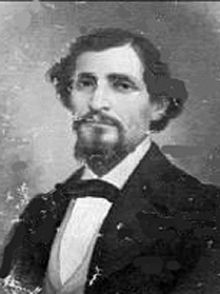Cenobio Paniagua
Mexican composer
You can help expand this article with text translated from the corresponding article in Spanish. (August 2021) Click [show] for important translation instructions.
- Machine translation, like DeepL or Google Translate, is a useful starting point for translations, but translators must revise errors as necessary and confirm that the translation is accurate, rather than simply copy-pasting machine-translated text into the English Wikipedia.
- Do not translate text that appears unreliable or low-quality. If possible, verify the text with references provided in the foreign-language article.
- You must provide copyright attribution in the edit summary accompanying your translation by providing an interlanguage link to the source of your translation. A model attribution edit summary is
Content in this edit is translated from the existing Spanish Wikipedia article at [[:es:Cenobio Paniagua]]; see its history for attribution. - You may also add the template
{{Translated|es|Cenobio Paniagua}}to the talk page. - For more guidance, see Wikipedia:Translation.

Cenobio Paniagua (1821–1882)
Cenobio Paniagua y Vásques (September 30, 1821, Tlalpujahua, Michoacán – November 2, 1882, Córdoba, Veracruz) was a Mexican composer.
Paniagua completed his studies in violin and became the Second Conductor of the Cathedral Orchestra of Mexico City. He founded a music academy in the city. Later, he lived in Havana, and after 1868, in Córdoba.
He composed several operas, including Catalina de Guisa which was the first Mexican opera seria, the oratorio Tobías, as well as seventy masses, and also produced writings on music theory.
Sources
- Orrego-Salas, Juan (2001). "Paniagua y Vasques, Cenobio". In Sadie, Stanley; Tyrrell, John (eds.). The New Grove Dictionary of Music and Musicians (2nd ed.). London: Macmillan Publishers. ISBN 978-1-56159-239-5.
- v
- t
- e









